Current Students and Alumni
NIH National Research Service Award (NRSA) Fellowships
The goal of the NIH Ruth L. Kirschstein National Research Service Award (NRSA) program dual-doctoral degree, predoctoral fellowship (F30) is to improve the research and clinical training of promising predoctoral students who are enrolled in a combined MD/PhD or other dual-doctoral degree training program and want to work as physician-scientists or other clinician-scientists. The fellowship experience is expected to clearly enhance the individuals’ potential to develop into productive, independent physician-scientists or other clinician-scientists. The award enables promising predoctoral students to obtain individualized, mentored research training from outstanding faculty sponsors while conducting dissertation research in scientific health-related fields.
In recognition of their potential and accomplishments, CTVR is proud to announce that three students, Samuel Du (F30), John Hong (F30) and Zachary Engfer (F31) were each recently awarded 5 years of NRSA support from the National Eye Institute based on their first applications!
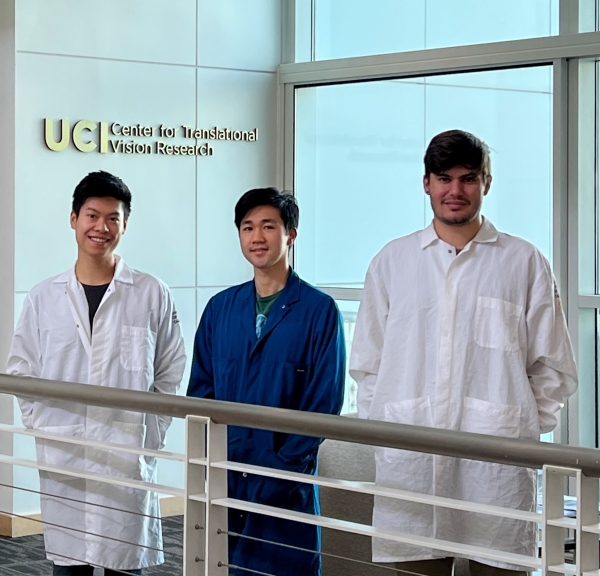
Samuel Du
Samuel came into his MD/PhD training with an extraordinary wealth of research experience, recently publishing his tenth paper from his undergraduate work and post-bachelor’s research. These include five first-author research publications and five co-author publications in journals such as the Journal of Clinical Investigation, Journal of Experimental Medicine, Journal of Immunology, and the European Journal of Immunology. It is clear from his pre-doctoral work that he is a highly productive and talented scientist, with an exceptionally strong foundation for his doctoral research. As a member of the Palczewski laboratory since 2020, Samuel has quickly mastered the technical skills needed for success, ranging from cutting edge molecular biology cloning techniques to highly challenging mouse surgeries, such as subretinal injections. His research progress on applying these techniques to basic physiology and genome editing of the eye has led to co-authorships on a pair of papers that were accepted at Cell and Nature Communications. These resulted from his close collaboration with a graduated MD/PhD student, Dr. Susie Suh, and the laboratory of David Liu at the Broad Institute. Additionally, Samuel initiated a first-author review article on microRNA physiology in the retinal pigment epithelium that was published in Trends in Neurosciences in January 2022.
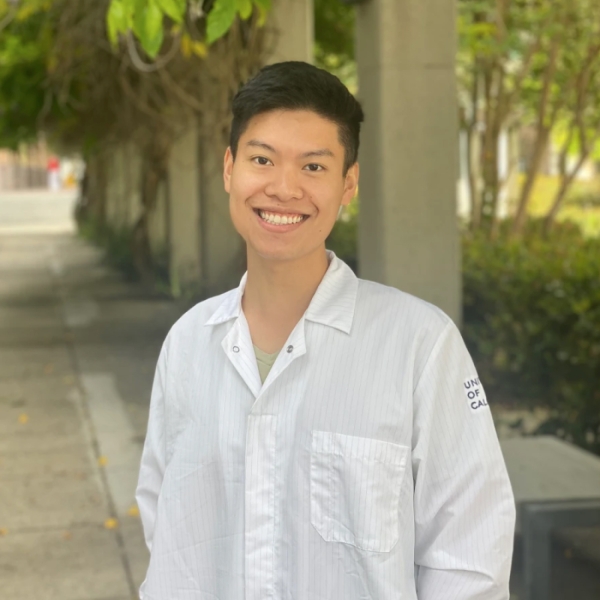
Zachary Engfer
Since joining Dr. Palczewski lab in the Center for Translational Vision Research (CTVR) at the beginning of 2021, Zachary has demonstrated exceptional tenacity and drive to advance his research and obtain the training he needs to fulfill his future goal of becoming an independent investigator. His research interests are multifaceted, and he is currently spearheading two independent projects while assisting with a third, collaborative effort. His primary project focuses on studying retinoid flux and the biochemical basis of a two-cell visual chromophore recycling pathway, i.e., the “visual cycle”, via the manipulation of two key enzymes in murine retinas. Zachary’s main goal with his core project is understanding how engineering Lrat and Rpe65 expression in the photoreceptors (normally these are endogenously expressed in the RPE) affects retinoid flux and influences normal retinal function and morphology. Understanding how perturbations to the visual cycle affect both health of the retina and movement of retinoid intermediates provides insight into potential metabolic networks that need to be addressed for effective treatment and/or reversal of specific retinal degenerative pathologies. Additionally, Zachary is working on generating new antibodies against rod- and cone-specific cyclic nucleotide-gated channel isoforms that are responsible for generating the initial hyperpolarization response in the photoreceptors. Zachary has demonstrated a profound keenness to engage with the biomedical research community at large, and he actively engages with guest speakers in an array of diverse fields. Innate enthusiasm, serious work ethic, and curiosity for discovery is essential for a lifelong career in research, and Zachary displays these attributes on a daily basis. His commitment to bettering human health through a balance of basic and translational research identifies him as a student who will continue a schoolwide commitment to excellence and empathy in biomedical research as he continues with his career.
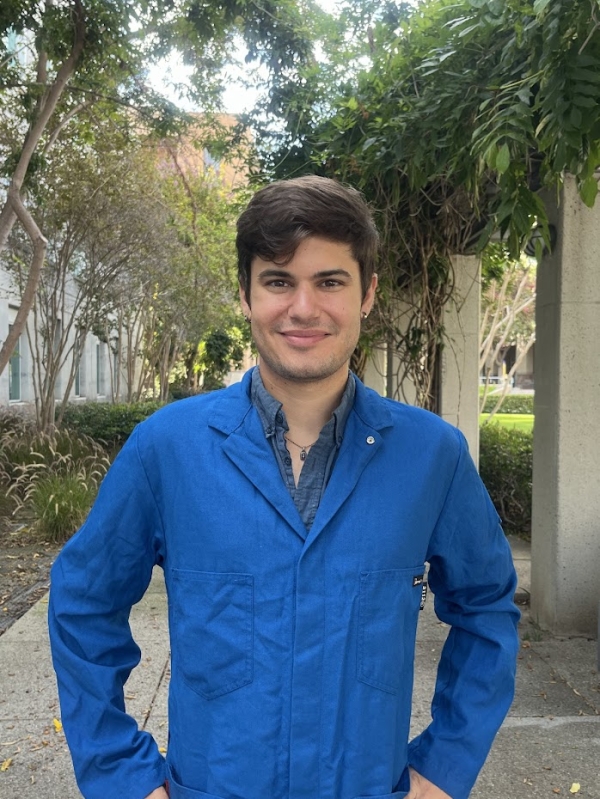
Kristen Fong
Kristen Fong is an undergraduate student currently pursuing her B.S. in Biological Sciences at UCI. Kristen's background as an Optometric Technician inspired her to pursue a more comprehensive understanding of ocular health with experiences in both patient care and research. She joined the Palczewki laboratory as an undergraduate researcher under the mentorship of Dr. Krzystof Palczewski and Dr. Alex Tworak in 2024. Her current research project with Dr. Tworak encompasses studying the function of the membrane frizzled-related protein (MFRP) and prime gene editing in to alleviate ocular symptoms related to mutations in the structural transmembrane protein peripherin-2 (PRPH2). She is passionate about the progression of gene editing and its subsequent impact on treatment for ocular diseases.
Hernan Gomez
Hernan Gomez is a second year graduate student in the chemistry department. Hernan previously had one year of undergraduate research experience developing nanoparticles to target toxic peptides and proteins. Post graduation he spent one year in industry at Takeda Pharmaceuticals where he learned about the potential of plasma derived protein therapeutics and how to perform analysis on them. Following his experience, he decided to continue to pursue his research experience and joined the chemistry PhD program at UCI to further investigate areas of chemical biology. Curious about exploring a new area of science, he joined the Palczewski laboratory in 2022. Since then, he has begun studying ophthalmology and expanding my knowledge on related fields to begin developing his research project. From the collaborative nature of the lab, he hopes to learn and develop his technical skills from wide range of disciplines available to eventually apply them to his research project. Currently he is synthesizing retinoid compounds to test if they stabilize the P23H rhodopsin mutant.
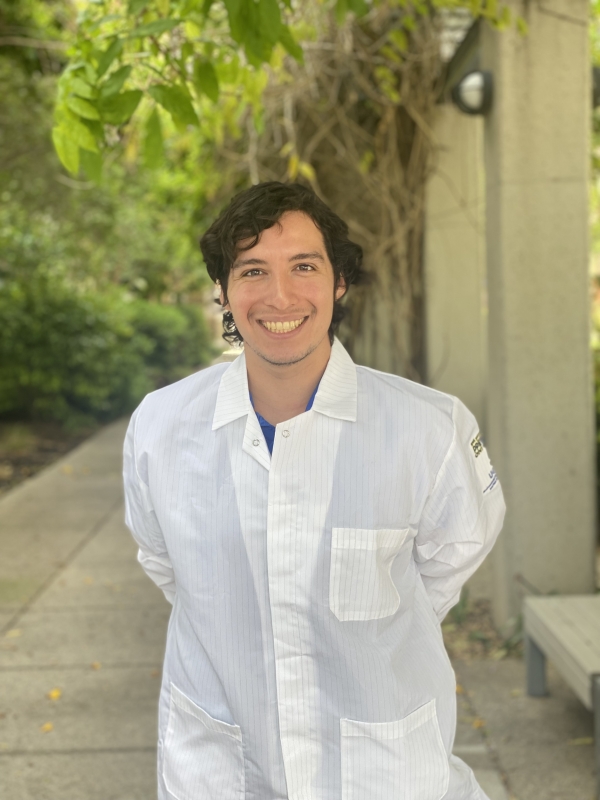
Fang-Shiuan (Sherry) Leung
Sherry is a second-year PhD student in Physiology and Biophysics at UC Irvine. She completed her B.S. in Biological Sciences at UC Davis in 2018, where her curiosity for in vivo modeling and clinical applications began. Her undergraduate research encompassed inflammation and tissue regeneration, behavioral studies, and mouse genetic engineering, leading to two co-authorship publications.
Post-graduation, Sherry furthered her research at UC San Francisco for over four years as an Assistant Specialist. Her focus was on morphogenesis and signaling in craniofacial and foregut development, alongside providing technical support in generating seven CRISPR/Cas9-edited mouse lines using i-GONAD (improved-genome editing via oviductal nucleic acids delivery). This phase of her career contributed to co-authorships in prestigious journals such as eLife and Nucleic Acids Research, along with two forthcoming papers. Additionally, her research on the function of a novel chaperone protein, Pfdn1, in cleft palate pathogenesis and brain development is expected to culminate in a first-author publication.
In 2023, Sherry began her PhD in Genetics and Genomics at Baylor College of Medicine, delving into genetics and genomics through rigorous coursework and lab rotations. Her work during this period includes an upcoming co-authored publication applying high-throughput proteomic profiling to space omics at the Human Genome Sequencing Center. Subsequently, she joined Dr. Rui Chen's lab relocated with the team to UC Irvine in 2024, focusing on the mechanisms of the ABCA4 gene in macular degeneration and developing gene therapies for inherited retinal diseases.
Besides her academic pursuits, Sherry is an active volunteer in various non-profit biomedical associations, aiming to inspire and collaborate with young scientists in the biomedical field.
Carolline Menezes, M.D.
Carolline is a medical doctor and incoming Ph.D. graduate student who will be training under the mentorship of Dr. Krzystof Palczewski. Carolline joined the Palczewski laboratory as a postdoctoral researcher in 2022 and quickly distinguished herself with her strong work ethic and tenacious desire to learn. Carolline’s robust foundation and background in Medicine laid the framework for swift acquirement of a multitude of complex and cutting-edge techniques ranging from multimodal imaging to highly challenging mouse surgeries, such as subretinal injections. Her research objectives are to contribute to the field of genome editing targeting inherited retinal disorders. Carolline is dedicated to understanding the pathophysiology of these burdensome diseases and devoting time to providing tools that could contribute to people’s quality of life and to make an impact on their health. Carolline believes that through immersion and in-depth comprehension of the scientific method will allow for full interpretation of these findings and developing critical sensibility as both a clinician and a scientist. With her research, Carolline aims to further her studies in disease-causing mutations and exploiting genome editing technologies and their potential as novel therapeutic approaches. Carolline hopes to extend her research outreach to progress her contributions that have the potential for translation and accessibility to low-income communities, as the one she has come from, and for that reason, she also takes part in various initiatives that foster relationships with at-risk communities and providing access to care. Carolline ultimately wholeheartedly believes in research as a transformative and impactful journey that shares a common value with Medicine: to serve others and allow for a continuum place of growth and understanding.
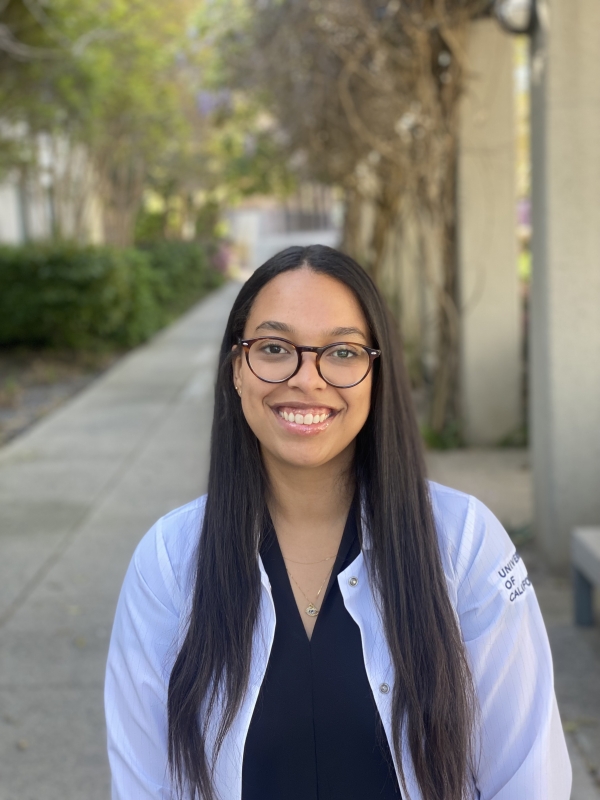
Eleonora Risaliti
Eleonora Risaliti is a recent graduate of the University of Pisa, where she earned her Master of Science degree in Neuroscience with a thesis on dopaminergic drugs and neurotoxins affecting pancreatic beta cells. Before pursuing her Master's degree, Eleonora earned a Bachelor of Science in Biology from the Università degli Studi di Firenze. As an intern at National Research Council in Pisa, her thesis focused on the isolation of exosomal microRNAs as potential biomarkers. During her Master’s degree, Eleonora was involved in research projects that led to the publication of two scientific papers. She conducted experiments on the vulnerability of β-cells to Parkinsonian neurotoxins and as first author, she performed a statistical analysis regarding five years of data from therapeutic drug monitoring. She also had the opportunity to collaborate with the Spacelab of the University of Pisa for the design and analysis of a biological experiment in the stratosphere. Having a strong desire to explore a new field of science, Eleonora joined the Palczewski laboratory as Junior Scientist and she will soon be embarking on her journey as a PhD student in the Physiology & Biophysics graduate program. She is excited to expand her knowledge and skills in this new area of science and is eager to contribute to the field through her research.
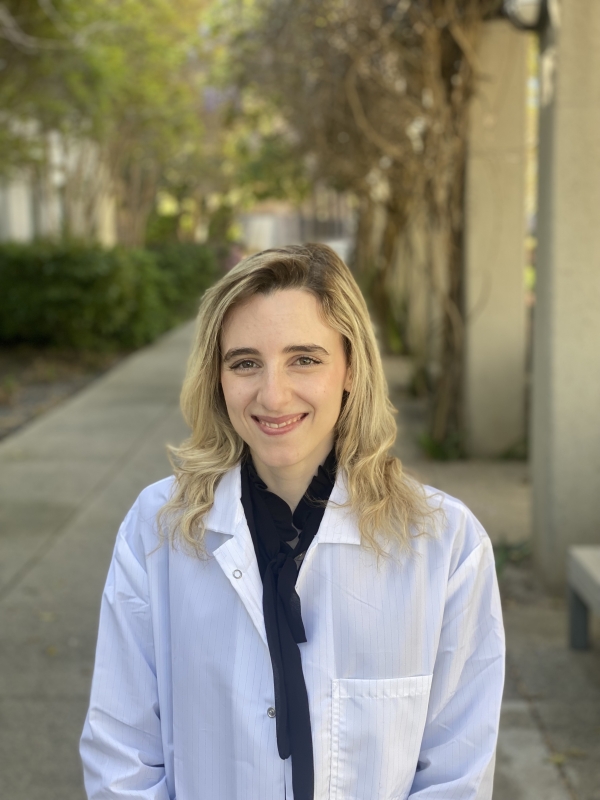
Yasmeen Joannna Solano Rodriguez
Yasmeen Solano is a Ph.D. graduate student who is training under the mentorship of Dr. Philip Kiser. Yasmeen’s research interest involves the development of unfamiliar proteins involved in critical biological systems. Specifically, Yasmeen’s current objectives are to contribute scientific findings towards various proteins that take part within the visual cycle, one of them being Lecithin retinol acyltransferase (LRAT). LRAT is a retinyl ester synthase, catalyzing the formation of fatty acid retinyl esters, a crucial step in the retinoid cycle. In the eye, it is specifically expressed in the RPE, therefore, LRAT dysfunction leads to diminished visual chromophores and eventual retinal degeneration. Loss-of-function of LRAT in humans causes severe vision loss, ultimately developing into retinitis pigmentosa (RP). What captures Yasmeen’s interest the most about this protein is that at present, native LRAT, an integral membrane protein, has never been purified and its structural knowledge is not fully established. By applying various biochemical techniques, Yasmeen has expressed, solubilized, and purified a fully functioning LRAT protein. This sets the stage for Yasmeen to move onto crystallizing the protein and obtain an overall better structural understanding of native LRAT. As she strives to expand the development of proteins within the visual cycle, Yasmeen has also taken the role of mentoring undergraduates in the lab. She finds it critical to take part in mentorship and outreach as she notes that if outreach would have been accessible to her in her lower income community, her love for science would have started at a much younger age. For that reason, her and her mentor are working to provide a day of science to low-income students in neighboring minority-filled communities. Outside of lab, Yasmeen enjoys spending time with her family and creating new memories with her newborn son, Eleus.
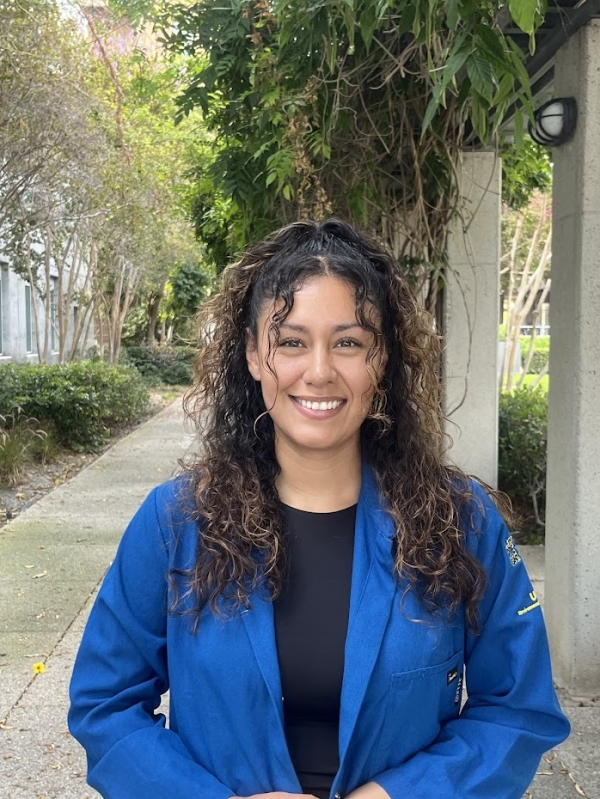
Emily Tom
Ms. Emily Tom is an M.D./Ph.D. trainee under the mentorship of Dr. Dorota Skowronska-Krawczyk. Emily’s research interest concentrates on the molecular mechanisms of aging and age-related eye diseases. Emily has conducted key cell-based assays to characterize the phenotype of decreased ELOVL2 expression in human ARPE19 and iPSc-RPE cells, including the establishment of a novel lipidomics-based approach to measure phagocytic function in a quantifiable, sensitive, and reproducible manner. Her contributions to the lipidomics field also include a co-first author mini review published in Frontiers in Aging in March 2022 on current technological advances to study lipids in aging. During her time in the laboratory, she has also mentored several undergraduate students and a senior-year high school student in the lab. Outside of the lab, Ms. Emily Tom is an active member of the UCI community. Her interest in ophthalmology spans beyond just the lab bench. She volunteers with the Orange County Eye Project (OCEP), led by Retina Global and Dr. Rajat Agarwal, to provide free eye exams at their monthly clinic in Orange. She then leveraged her position as co-president of the Ophthalmology Interest Group at UCI to establish a volunteer program for medical students with OCEP. Additionally, working together with a group led by Dr. Donny Suh, she developed, clinically tested, and validated a smartphone app to measure visual acuity. In addition, her strong science communication skills led her to be selected as a Loh Down on Science Fellow, where she writes and edits scripts for a science podcast that is broadcasted on NPR.

Susie Suh, now at Case Western Reserve University, finishing MD program
Elliot Choi, now at Case Western Reserve University, finishing MD program
Anahita Darwalla, now Senior Associate Scientist at 23andMe
Christopher Sander, now Senior Scientist at Evotec
Avery Sears, now at Case Western Reserve University, finishing MD program